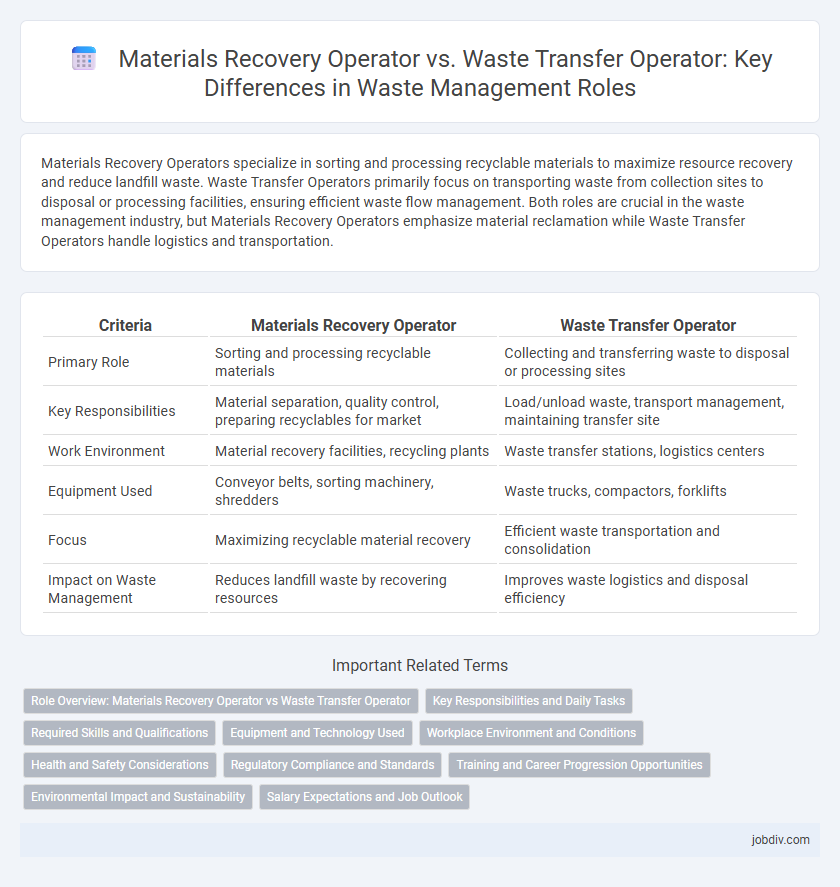Materials Recovery Operators specialize in sorting and processing recyclable materials to maximize resource recovery and reduce landfill waste. Waste Transfer Operators primarily focus on transporting waste from collection sites to disposal or processing facilities, ensuring efficient waste flow management. Both roles are crucial in the waste management industry, but Materials Recovery Operators emphasize material reclamation while Waste Transfer Operators handle logistics and transportation.
Table of Comparison
| Criteria | Materials Recovery Operator | Waste Transfer Operator |
|---|---|---|
| Primary Role | Sorting and processing recyclable materials | Collecting and transferring waste to disposal or processing sites |
| Key Responsibilities | Material separation, quality control, preparing recyclables for market | Load/unload waste, transport management, maintaining transfer site |
| Work Environment | Material recovery facilities, recycling plants | Waste transfer stations, logistics centers |
| Equipment Used | Conveyor belts, sorting machinery, shredders | Waste trucks, compactors, forklifts |
| Focus | Maximizing recyclable material recovery | Efficient waste transportation and consolidation |
| Impact on Waste Management | Reduces landfill waste by recovering resources | Improves waste logistics and disposal efficiency |
Role Overview: Materials Recovery Operator vs Waste Transfer Operator
Materials Recovery Operators specialize in sorting, processing, and extracting recyclable materials from waste streams to maximize resource recovery and reduce landfill use. Waste Transfer Operators handle the collection, transportation, and temporary storage of waste between collection points and final disposal or recycling facilities, ensuring efficient waste flow and minimizing environmental impact. Both roles are critical in integrated waste management systems, with Materials Recovery Operators focusing on material reclamation and Waste Transfer Operators emphasizing logistical coordination.
Key Responsibilities and Daily Tasks
Materials Recovery Operators specialize in sorting and processing recyclable materials such as paper, plastics, metals, and glass to ensure maximum resource recovery and minimize landfill waste. Waste Transfer Operators manage the loading, unloading, and transportation of waste materials between collection points and disposal or processing facilities, ensuring efficient logistics and compliance with environmental regulations. Both roles require attention to safety protocols, equipment operation, and maintaining accurate documentation for waste tracking and reporting.
Required Skills and Qualifications
Materials Recovery Operators require extensive knowledge of sorting techniques, strong attention to detail, and proficiency with automated sorting equipment to efficiently separate recyclable materials. Waste Transfer Operators need skills in operating heavy machinery, logistics coordination, and understanding waste handling regulations to manage the transport and consolidation of waste effectively. Both roles demand adherence to safety standards and the ability to work in physically demanding environments.
Equipment and Technology Used
Materials Recovery Operators utilize advanced sorting technologies such as optical sorters, magnetic separators, and conveyor systems to efficiently separate recyclables from mixed waste streams. Waste Transfer Operators rely on heavy machinery like compactors, loaders, and transfer trailers to transport large volumes of waste from collection points to processing or disposal sites. Integration of automated equipment in Materials Recovery facilities enhances material purity, while Waste Transfer operations prioritize robust logistics and vehicle technology to optimize waste movement.
Workplace Environment and Conditions
Materials Recovery Operators work predominantly in recycling facilities where noise levels from machinery and dust exposure require protective equipment and strict adherence to safety protocols. Waste Transfer Operators operate in transfer stations or yards, often exposed to varying weather conditions and the need to handle bulky waste, demanding physical resilience and good organizational skills. Both roles require vigilance to prevent workplace accidents and maintain environmental compliance standards.
Health and Safety Considerations
Materials Recovery Operators face health and safety risks primarily from exposure to hazardous materials, sharp objects, and repetitive motion injuries during sorting processes. Waste Transfer Operators encounter dangers related to heavy vehicle operation, manual handling, and exposure to biohazards when consolidating and transferring waste loads. Both roles require strict adherence to PPE protocols, ergonomic practices, and comprehensive training to minimize injury and exposure risks.
Regulatory Compliance and Standards
Materials Recovery Operators must comply with stringent regulations including the Resource Conservation and Recovery Act (RCRA) and adhere to Environmental Protection Agency (EPA) standards for processing recyclable materials. Waste Transfer Operators follow regulations set by the Department of Transportation (DOT) and local environmental agencies to ensure safe and compliant handling during waste transportation and transfer. Both roles require adherence to Occupational Safety and Health Administration (OSHA) guidelines to maintain workplace safety and environmental protection.
Training and Career Progression Opportunities
Materials Recovery Operators undergo specialized training in sorting, processing recyclables, and operating advanced machinery, which enhances their skills in material identification and contamination reduction. Waste Transfer Operators receive training focused on logistics, vehicle operation, and regulatory compliance, preparing them for efficient waste collection and transfer station management. Career progression for Materials Recovery Operators often leads to supervisory roles in recycling facilities, while Waste Transfer Operators can advance to logistics coordinators or environmental compliance managers.
Environmental Impact and Sustainability
Materials Recovery Operators significantly reduce landfill waste by efficiently sorting and processing recyclable materials, thereby minimizing environmental pollution and conserving natural resources. Waste Transfer Operators primarily facilitate the transportation of waste to disposal or processing facilities, with less direct impact on reducing waste generation or promoting resource recovery. Prioritizing Materials Recovery Operators in waste management strategies enhances sustainability by maximizing material reuse and reducing greenhouse gas emissions associated with waste decomposition.
Salary Expectations and Job Outlook
Materials Recovery Operators typically earn between $30,000 and $45,000 annually, with growth driven by increasing recycling initiatives and demand for sustainable waste management. Waste Transfer Operators have a similar salary range of $28,000 to $43,000, supported by stable job prospects due to ongoing waste collection and transfer needs. Both roles benefit from expansion in environmental regulations and public awareness, enhancing long-term employment opportunities in the waste management sector.
Materials Recovery Operator vs Waste Transfer Operator Infographic

 jobdiv.com
jobdiv.com